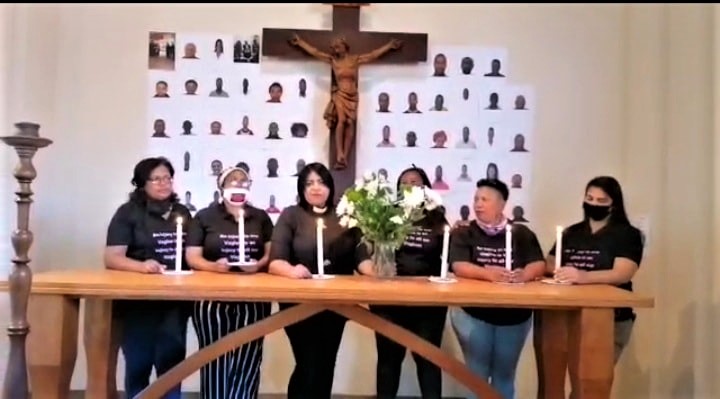“I’ve cried many times before, but this time was different. I wept from the very depths of my soul.”
June Dolley-Major posted these words on her Facebook page after visiting the house in Makhanda where 18 years ago she had stayed to prepare for a new chapter in her life. Instead of laying the foundation for her calling as a priest, it was the scene of an incident that has haunted her ever since.
On Wednesday 21 October Dolley-Major, an ordained Anglican priest, took a huge step across the country from her Cape Town home and towards closure, to re-open a case against her alleged rapist at the Family Violence, Child Protection and Sexual Offices unit of the South African Police Service in Makhanda. The man she has accused of rape is a member of the clergy who lives and works in Cape Town. The charge was laid in Makhanda because this is where the alleged crime was committed in 2002.
The Anglican Church has stated it is pleased the case has been reopened. Its Safe and Inclusive Church Commission met with Dolley-Major earlier this month to prepare a charge sheet so the rape charge can additionally be brought before a Church Tribunal.
Gender activists from One Billion Rising South Africa (OBRSA) travelled from Cape Town to Makhanda with Dolley-Major.
Lucinda Evans, Director of One Billion Rising South Africa, said, “We are here to support Reverend Dolley-Major because rape and violence against women in South Africa has reached pandemic proportions, beyond anything we have seen from the Covid-19 virus. We are not seeing government take the necessary accountability to protect us and that is why this kind of solidarity on the front lines is crucial.
“Until we get strong, direct and tangible actions from government to end the violence, we will be here raising our voices as a global movement to support women who are raped and then revictimised by society and the justice system. We need more front line services for women and children – legal and medical protection services.”
Dolley-Major said, “It is important not only for my own healing that I made this journey and reclaim all that I have lost since the rape, but it is also a crucial step for other victims and survivors of rape and violence to know that our criminal justice system can be fair, supportive and just.”
In July she conducted a week-long hunger strike while camped outside the Archbishop’s residence in Cape Town.
The Makhanda house where the alleged rape was committed is owned by the College of the Transfiguration and has been unoccupied for some time. Dolley-Major and members of One Billion Rising South Africa visited to lay flowers there last week.
Afterwards, on her Facebook page @Justiceforallwomen, Dolley-Major wrote, “As I found myself at the crime scene, looking at the door, with still no lock on it. I started to shake… I held on to the walls as I tried to get out of that dreadful room… My legs went weak and I fell down, I crawled to the passage, and I wept and wept… I’ve cried many times before, but this time was different. I wept from the very depths of my soul.”
Rector of the College of the Transfiguration Reverent Vincentia Kgabe confirmed that the group had visited the campus.
“Reverend June stopped by the College for a time of prayer and candle lighting in our college Chapel and left immediately after that,” she said.
Kgabe referred other questions to the Archbishop, as the designated spokesperson for the Church.
The Archbishop’s Office in turn referred them to the Safe Church Commission, which in turn referred them to the Church’s Media Office. A Church spokesperson responded as follows:
“When the complaint was first raised with the current leadership of the Church in 2016, we urged Reverend Major to lay a charge with the police, and also to put her case in writing to the Church so that it could be handled under church law. She went to the police and they investigated, but a prosecutor in Grahamstown declined to prosecute.
“In July this year, we urged that the case be reopened, and are pleased that it has been. Also in July, the Reverend Major – in response to a renewed request by Archbishop Makgoba – put her case in writing to the Church. It was referred to the Church’s Safe and Inclusive Church Commission, which was established to assist members by providing compassionate support in seeking redress for all forms of alleged abuse by ministers of our church.”
Dolley-Major had met two members of the Commission on 5 October to prepare a charge sheet (Articles of Presentment), which would enable the rape charge to be brought before a Tribunal of the Church, the spokesperson said.
“We will inform the public when the Tribunal is established.”
South African Police spokesperson Captain Khaya Tonjeni confirmed that Dolley-Major had been to the SAPS Family Violence, Child Protection and Sexual Offices unit in Makhanda.
The Director of Public Prosecutions had previously declined to prosecute the docket, Tonjeni said.
“The docket has been assigned another investigator who will further investigate following additional information, and [it will]thereafter be presented to the Director of Public Prosecutions for a decision.”


